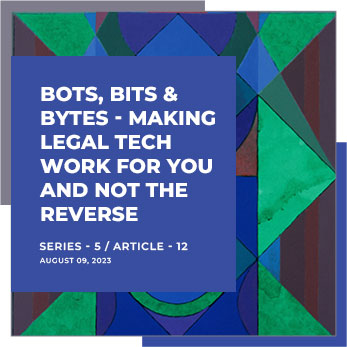On September 9, 2021, President Biden signed into law what have been described as sweeping vaccine mandates designed to combat the Public Health Emergency (PHE), commonly known as the COVID-19 pandemic.
Through the use of Executive Orders, the President mandated COVID-19 vaccinations for millions of Americans, further bolstered by OSHA’s Emergency Temporary Standard (ETS) covering vaccinations for businesses employing more than 100 workers. But no sooner was the ink dry on the Executive Orders before strong opposition was voiced and court challenges were filed. Can efforts to combat the worst pandemic in 100 years be reconciled with venerable Constitutional private rights?
Federal Employees and Federal Contractors
The first Executive Order, “Executive Order on Requiring Coronavirus Disease 2019 Vaccination for Federal Employees”, also referred to as the ‘Federal Employee Order’, requires that all federal employees be vaccinated, and that all federal agencies implement a mandatory vaccination program. The Safer Federal Workforce Task Force has been tasked with issuing guidance as to how the vaccination mandate should be carried out. The Executive Order cites as exceptions to the Federal Employee Order, ‘any exception that is required by law’, which essentially covers medical exceptions and objections based on firmly held religious beliefs. As of the November 22, 2022 deadline for vaccination, it was estimated that approximately 95% of the nation’s 3.5 million federal employees had complied with the requirement, however, the White House noted that any federal worker who was in the process of getting vaccinated or of requesting an exemption would be deemed to be ‘in compliance’.
The second Executive Order, “Executive Order on Ensuring Adequate Covid Safety Protocols for Federal Contractors”, also known as the ‘Contractor Order’, mandates vaccinations for certain employees of federal contractors and subcontractors. Federal contracts are now required to have a contract clause–as drafted by the newly created Federal Acquisition Regulatory Council–inserted into all federal contracts requiring contractors and subcontractors to comply with the guidance published by the Safer Federal Workforce Task Force. Accordingly, the legal tool to enforce vaccination in the federal contractor sector will be via contract as opposed to other federal legislation. The term ‘contractor’ is in fact quite a broad one, encompassing, for example any university engaged in research for a U.S. agency. However, excluded from the Contractor Order are those employees performing work outside of the U.S.
OSHA’s ETS
Paralleling the President’s Executive Orders, is OSHA’s ETS mandating vaccination compliance by large employers. Perhaps the most expansive of the mandate measures taken to date, the ETS mandates that all employers with 100 or more employees require their employees to either get vaccinated, or, present a weekly negative test result prior to coming in to the workplace. The ETS alone will likely affect more than 80 million American workers.
Not Without Its Challenges
Several notable legislative and legal challenges have been brought to bear on the vaccine mandates. In U.S. Navy Seals v. Biden, 4:21-cv-01236-O (February 13, 2022), a preliminary injunction enjoined the Navy from enforcement of the Navy’s COVID vaccination policies against thirty-five Navy SEALs who objected to the vaccine on religious grounds. The SEALs subsequently alleged that the Navy violated the injunction by preventing some SEALs from attending training, receiving medical treatment, or returning to their job duties. The government moved to stay the injunction, arguing that the preliminary injunction intruded upon the Navy’s ability to make assignment and reassignment decisions that the military deemed appropriate.
The court disagreed, noting that the injunction did not affect purely military decisions, rather, whether the vaccine mandate passed muster under the First Amendment and the Religious Freedom Restoration Act of 1993 (RFRA). Framed thusly, the issue was not a military one, but a purely legal question appropriate for judicial review, and the court denied the motion to stay the preliminary injunction. Skeptics
questioned whether the Navy was nevertheless likely to interpret the ruling so as to reassign SEALS based on vaccination status. According to Mike Berry, director of military affairs and senior counsel at First Liberty, the attorneys representing the SEALs: “Thus far, in this litigation and with the vaccine mandate, the Navy has continued to act as if it’s above the law, so that [reassignment] wouldn’t surprise me. But at the end of the day, they need to follow, they need to abide by the rulings of the court.”
‘Accommodation’ Amounting to Religious Coercion
In Sambrano v. United Airlines, Incorporated, 21-11159 (February 17, 2022), the appeals court reversed the district court and ruled that United’s policy for ‘accommodating’ vaccine refusers who had cited religious grounds–an accommodation that meant unpaid leave–constituted religious coercion under Title VII and did indeed amount to irreparable harm.
Clashing With State Law
In Montana Medical Association v. Knudsen, 9:21-cv-00108-DWM (March 18, 2022), the court found that certain medical providers were faced with an ‘impossible choice’ of complying with the state’s statute prohibiting the withholding of goods, services or employment based on a person’s vaccination status, or, with CMS’s Interim Final Rule imposing severe penalties on providers who did not maintain a vaccination policy and requirement. In that case, the federal CMS rule was found to preempt the state statute which had to yield to CMS.
We have not heard the last of COVID-19, and not of the statutes, executive orders, rules, and regulations attempting to impede its spread—nor opposition to such regulation. The net of mandatory compliance has been cast quite broadly, and employers would to do well to stay familiar with what is required as well as what has exceeded government authority.
Executive Summary
The Issue
What are the overall COVID-19 mandates affecting your business operations?
The Gravamen
The government’s campaign to achieve 100% vaccination status for non-exempt employees is an aggressive one, comprised of a raft of statutes, rules and regulations that owners and operators of all businesses must become familiar with.
The Path Forward
Both HR, legal, and operations managers must treat COVIDS-19 compliance in the same light as any other risk management and compliance assessment for your business.
Action Items
Learn:
Meet with your HR and legal departments to become fully versed in what is required of your employees in your particular business, assessing for example, whether the Contract Order, OSHA’s ETS, or a state statute require you to take certain actions and set certain policies.
Prepare Response to Exemptions:
Examine what your company will do in cases of legitimate refusal to comply based on firmly held religious beliefs, medical reasons, or any other exempt status that may be asserted.
Title VII, RFRA, and Constitutional Issues:
Make certain that whatever policies your company develops for complying with COVID-19 vaccination mandates and policies pertaining to exempt employees, do not run afoul of other rights that your employees are entitled to, thereby exposing your company to liability.
Staying Updated:
Like the COVID-19 virus with its variants and mutations, regulatory responses to it are likewise ever-changing and still evolving. Keep abreast of how those changes affect your business and employees.
Further Readings
- https://www.huschblackwell.com/newsandinsights/legal-overview-executive-orders-on-vaccine-mandates
- https://coronavirus.rutgers.edu/president-bidens-executive-order-requiring-coronavirus-vaccines/
- https://www.politico.com/news/2021/11/22/biden-vaccine-mandate-compliance-523179
- https://www.cnbc.com/2021/12/07/who-on-vaccine-mandates-they-should-be-a-last-resort.html
- https://www.pewresearch.org/fact-tank/2021/10/08/states-have-mandated-vaccinations-since-long-before-covid-19/







